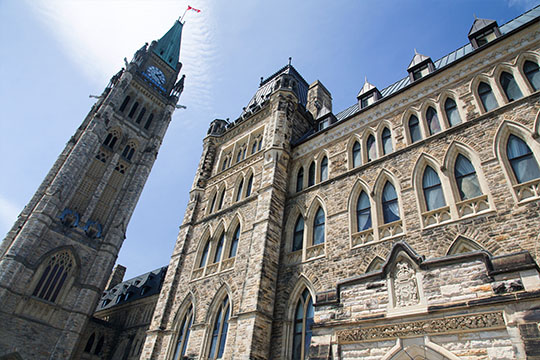
The federal government has undertaken some new initiatives in the face of COVID-19 and the economic uncertainty that has befallen many Canadians.
While some details are yet to be determined, the following highlights in the federal economic response plan are of interest for Federal Retirees members and Canadian seniors. Note that your province may also be initiating its own response plans and relief programs.
Impacts on retirement savings plans
The federal government will reduce the required minimum withdrawals from RRIFs by 25 per cent for 2020, in recognition of volatile market conditions and their impact on many seniors’ retirement savings. This will provide flexibility to seniors that are concerned that they may be required to liquidate their RRIF assets to meet minimum withdrawal requirements. Similar rules would apply to individuals receiving variable benefit payments under a defined-contribution Registered Pension Plan.
Changes for taxpayers
The Canada Revenue Agency will defer the filing due date for the 2019 tax returns of individuals, including certain trusts.
For individuals (other than trusts), the return filing due date will be deferred until June 1, 2020. However, the Agency encourages individuals who expect to receive benefits under the Goods and Services Tax Credit (GSTC) or the Canada Child Benefit not to delay the filing of their return to ensure their entitlements for the 2020-21 benefit year are properly determined.
The Canada Revenue Agency will allow all taxpayers to defer, until after August 31, 2020, the payment of any income tax amounts that become owing on or after today and before September 2020. This relief would apply to tax balances due, as well as instalments, under Part I of the Income Tax Act. No interest or penalties will accumulate on these amounts during this period.
In order to reduce the necessity for taxpayers and tax preparers to meet in person during this difficult time, and to reduce administrative burden, effective immediately the Canada Revenue Agency will recognize electronic signatures as having met the signature requirements of the Income Tax Act, as a temporary administrative measure.
Other provisions are being put in place by the Canada Revenue Agency, including ramping up its Outreach Program, which helps individuals better understand their tax obligations and entitlements. Some supports will be made available to taxpayers over the phone and through webinars.
Retirees still at work
Some retirees continue to work part-time or full-time, which may sometimes be for personal economic reasons. Many of these individuals are facing significant economic uncertainty. Some provisions being put in place by the federal government may be helpful for older Canadians who are still working.
The government will be waiving the one-week waiting period for those individuals in imposed quarantine that claim Employment Insurance (EI) sickness benefits. This temporary measure came in effect as of March 15, 2020.
The requirement to provide a medical certificate to access EI sickness benefits is also being waived.
The federal government will provide a new taxable benefit, the Canada Emergency Response Benefit (CERB), of $2,000 a month for up to 4 months to:
- workers who must stop working due to COVID-19 and do not have access to paid leave or other income support.
- workers who are sick, quarantined or taking care of someone who is sick with COVID-19.
- working parents who must stay home without pay to care for children that are sick or need additional care because of school and daycare closures.
- workers who still have their employment but are not being paid because there is currently not sufficient work and their employer has asked them not to come to work.
- wage earners and self-employed individuals, including contract workers, who would not otherwise be eligible for Employment Insurance.
There are two ways to apply for the CERB. Those who are eligible can apply online or over the phone with an automated phone service (1-800-959-2019 or 1-800-959-2041). This benefit replaces the previously announced Emergency Care Benefit and the Emergency Support Benefit.
Other measures
The finance minister is in regular contact with the heads of Canada’s large banks. They have been encouraged to show flexibility in helping customers affected by COVID-19. Banks in Canada have affirmed their commitment to working with customers to provide flexible solutions, on a case-by-case basis, for managing through hardships caused by recent developments. This may include situations such as pay disruption, childcare disruption or illness. Several of Canada’s large banks have confirmed that this support will include up to a six-month payment deferral for mortgages and the opportunity for relief on other credit products.
The Canada Mortgage and Housing Corporation (CMHC) and other mortgage insurers offer tools to lenders that can assist homeowners who may be experiencing financial difficulty. These include payment deferral, loan re-amortization, capitalization of outstanding interest arrears and other eligible expenses, and special payment arrangements.
For low- and modest-income families, who may require additional help with their finances, the government is proposing a one-time special payment by early May 2020 through the Goods and Services Tax Credit (GSTC). This will double the maximum annual GSTC payment amounts for the 2019-20 benefit year. The average boost to income for those benefitting from this measure will be close to $400 for single individuals and close to $600 for couples. This measure will inject $5.5 billion into the economy.
Federal Retirees is continuing to closely follow developments on COVID-19 and the federal government’s economic response plans.
Read more about the federal government’s COVID-19 economic response plan.
Last updated: April 6, 2020

